In general, I don't care for tumblehomed hulls. Their secondary stability is unreliable to downright flukey to pragmatically nonexistent. Flared hulls give tremendous predictability and stability in whitewater, in beam and quartering waves in flatwater, and for aggressive heeling maneuvers in all water. And just for
FUN!
Unlike the Lotus Egret in the above photo, I do like the gunwales to be recessed with a very small and sharp "shoulder" by the paddling station, so the outer edge of the outwale is about an inch less than flush with maximum hull beam right under the gunwale. I call this a Galt or Deal shoulder, in which the gunwale width will be about 2" less than the max hull width.
Mike Galt Lotus Caper:
Harold Deal SRT:
The exaggerated tumblehome shoulder tuck on Jim Dodd's stripper and stripperguy's Kite, and even many of Yost's designs, are very unappealing to me for secondary stability and aggressive heeling purposes, and completely unnecessary to me for forward stroke purposes. That's because I've been a single-sided correction stroke paddler for 64 years, who values progressive, solid and reliable heelability-to-the-rail for paddling in waves and for turning. The small minority of time I do switch paddle, I have absolutely no problem doing so in a narrow solo canoe such as the Caper (max. width 27.25", gunwale width 25.0") or the SRT (max. width 28.5", gunwale width 26.5").
A sit & switch racer or confirmed sit & switch recreational paddler would have different hull shape preferences from me. Namely, they'd prefer initial stability and lots of tumblehome to assist with the "no-
FUN and mind-numbing drudgery of endless, high rate hand switching" -- as Mike Galt, in early 80's, used to describe Harry Roberts' so-called North American Touring Technique or NATT. Roberts' name and acronym never caught on in the literature or displaced the older moniker of Minnesota switch paddling.
I wouldn't paddle the remote gorges of Siberia, Uzbekistan or Nepal in a tumblehomed hull on a month-long wilderness trip, not even the ones Mike McCrea leads.

